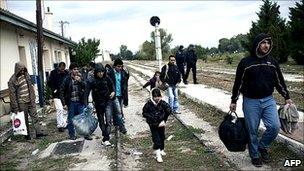EU teams to patrol Greek border amid migrant surge
- Published

Hundreds of migrants are entering Greece daily from Turkey, the UN says
The EU is for the first time sending border guards to help Greece stem an influx of migrants entering across the land border with Turkey.
Many of the illegal migrants claim to be from Afghanistan.
The Rapid Border Intervention Teams set up in 2007 "are activated today for the first time", the European Commission said late on Sunday.
The Commission said the flows of illegal migrants entering Greece had "reached alarming proportions".
Greece requested EU help. The UN says the burden on Greece is "critical".
Pressure point
Overall, there is a clear decline in the numbers of illegal migrants seeking to enter the EU, the EU's border agency Frontex says.
But it reports that illegal crossings on Greece's land border with Turkey have intensified. It recorded a six-fold increase there in the number of Afghans trying to enter Greece in the second quarter of this year.
In total during that period, 90% of the migrants detected trying to enter the EU illegally were on the Greek land border, Frontex says.
Half of those detected were Albanian workers looking for seasonal jobs in Greece, Frontex says. Albania borders on northwestern Greece.
But the other half - 9,500 - were migrants intent on travelling through Greece to settle in other EU member states.
Greece reported a total of 45,000 illegal border crossings for the first half of this year.
The European Commissioner for Home Affairs, Cecilia Malmstroem, said illegal migration was particularly "dramatic" along a 12.5km (eight-mile) stretch near the Greek town of Orestiada.
The EU teams, co-ordinated by Frontex, will be deployed at the Greek-Turkish border and "will act under the authority of Greece", on a mission of limited duration, she said.
Greek officials quoted by Frontex say up to 350 migrants are trying to enter Greece daily in the Orestiada area.
In early 2009, illegal crossings from Turkey to Greece were divided roughly equally between the land and sea borders, Frontex says.
Frontex speaks of "a continued and intensified shift from the Greek sea border to the Greek land border with Turkey, and an increase in the number and proportion of migrants claiming to be from Afghanistan, and to a lesser extent Somalia".
Armed officers
On 1 October Frontex opened a regional centre in Piraeus, Greece - the agency's first such office outside its Warsaw headquarters.
The new EU border teams will act as officers of the national border guards "and, as such, are authorised to carry their service weapons and wear their own uniform", .
"Nevertheless, a blue armband with the insignia of the European Union and Frontex must also be worn to identify them. They may consult the host member state's databases and, where necessary, use force."
A Commission spokesperson, Tove Ernst, told the 大象传媒 that the teams would carry out border checks like the Greek border guards. But the details of their deployment, including their total number, are still being worked out.
The EU officers "are regarded as officials of the host member state as regards offences committed against them or by them", according to the EU rules.
Asylum backlog
The EU is already helping Greece with money and other resources to reform its asylum system.
Last week a UN special rapporteur, Manfred Nowak, said "Greece should not carry the burden of receiving the vast majority of all irregular migrants entering the European Union". He was speaking after a fact-finding visit to Greece.
"This is a truly European problem which needs a joint European solution," he said.
Mr Nowak said the influx had put Greek border guard stations, police stations and migrant detention centres "into a critical state".
He found that some migrants had been confined for up to six months in overcrowded, filthy cells, with inadequate ventilation and lighting.
In some cases, office space had been turned into makeshift cells, he said. He called it "inhuman and degrading treatment".
In August, Greece had a backlog of 52,000 asylum claims waiting to be processed, he said.
The UN has recommended that EU member states stop returning migrants to Greece, arguing that the detention conditions there are inadequate and that migrants risk "refoulement" - transfer to places where their lives or freedoms could be at risk.
The EU's Dublin Regulation allows states to send asylum seekers back to the country where they first entered the EU, to have their application processed.
- Published27 July 2010
- Published17 June 2010